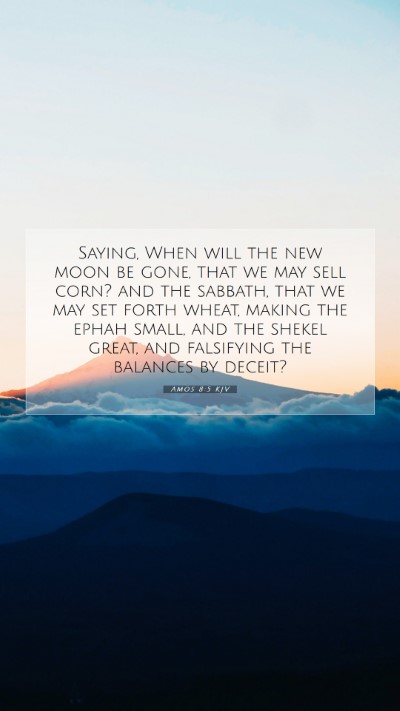Old Testament
Genesis Exodus Leviticus Numbers Deuteronomy Joshua Judges Ruth 1 Samuel 2 Samuel 1 Kings 2 Kings 1 Chronicles 2 Chronicles Ezra Nehemiah Esther Job Psalms Proverbs Ecclesiastes Song of Solomon Isaiah Jeremiah Lamentations Ezekiel Daniel Hosea Joel Amos Obadiah Jonah Micah Nahum Habakkuk Zephaniah Haggai Zechariah MalachiAmos 8:5 Meaning
What is the meaning of Amos 8:5?
Saying, When will the new moon be gone, that we may sell corn? and the sabbath, that we may set forth wheat, making the ephah small, and the shekel great, and falsifying the balances by deceit?
Amos 8:5 Bible Verse Meaning
Understanding Amos 8:5
The verse Amos 8:5 states, "Saying, When will the new moon be gone, that we may sell corn? and the sabbath, that we may set forth wheat, making the ephah small, and the shekel great, and falsifying the balances by deceit?" This verse delivers a deep critique of the attitudes of the people toward sacred times, revealing their desires and intentions.
Context of the Verse
The context of Amos 8:5 portrays a time when Israel was experiencing economic prosperity, but it came at a moral and spiritual cost. The people wished for the religious observances to be over so that they could resume their commercial greed.
Bible Verse Meanings
This verse highlights several key elements needing interpretation:
- Desire for Business Over Worship: The mention of the new moon and the Sabbath emphasizes the people's disdain for these sacred times, illustrating that their priorities lie more in making a profit than honoring God.
- Deceptive Practices: The verse indicates that they resorted to unethical practices, underscoring the moral decay in society where dishonesty replaces integrity.
- Spiritual State of Israel: The desire to hasten the holy days reflects a broader spiritual malaise within the nation, highlighting a disconnect between religious observance and everyday life.
Bible Verse Interpretations by Commentators
Examining insights from esteemed biblical commentators sheds more light on this verse:
- Matthew Henry: Henry emphasizes that the people’s hearts were far from God, and their eagerness for the commercial activities indicated their spiritual blindness. He suggests that their practices reflect a disdain for the holy times established by God.
- Albert Barnes: Barnes points out that this verse reflects the thoughts of merchants who were more concerned with profit margins than adherence to God’s commands. He underscores the significance of maintaining moral values in business dealings.
- Adam Clarke: Clarke provides historical context, explaining how the religious calendar affected agricultural cycles, but he criticizes the people for their lack of gratitude toward God for the harvests, as their focus was solely on profit.
Scripture Analysis
To grasp the deeper meaning of Amos 8:5, a thorough bible study analysis can be beneficial:
- Contrast with True Worship: The verse invites readers to reflect on how often our daily lives may prioritize worldly pursuits over a genuine relationship with God.
- Cultural Context: Understanding the ancient Hebrew customs related to the new moon and Sabbath enhances the understanding of why disdain for these practices is significant.
- Ethical Practices in Business: The mention of falsifying balances serves as a timeless reminder of the importance of integrity, urging us to consider the ethical implications of our actions in all professions.
Application of the Verse in Daily Life
Amos 8:5 serves as both a warning and a call to reflection in modern life:
- Prioritize Spirituality: It urges individuals to ensure that their spiritual commitments are not overshadowed by material pursuits.
- Integrity in Transactions: The verse promotes ethical behavior in business, encouraging practices that honor God and serve others.
- Awareness of Spiritual Deterioration: It invites self-examination to assess whether one’s heart is aligned with God or with worldly desires.
Cross References
This verse resonates with various other scriptural passages, such as:
- Micah 6:10-12 - A clear condemnation of dishonest trade practices.
- Isaiah 1:13-14 - God’s disdain for hollow religious rituals.
- Matthew 23:23 - Jesus’ rebuke of the Pharisees for neglecting justice and mercy in their religious observances.
Conclusion
In summary, Amos 8:5 provides a profound bible verse explanation regarding the conflict between sacred time and the greed of the heart. By exploring this scripture through careful analysis and interpretation, believers can gain valuable insights into their own spiritual lives and practices.
This verse serves as a reminder that true worship reflects not only in the rituals we perform but in the sincerity of our hearts and our ethics in daily life.


